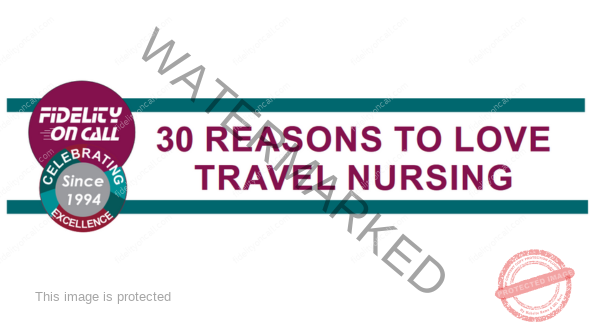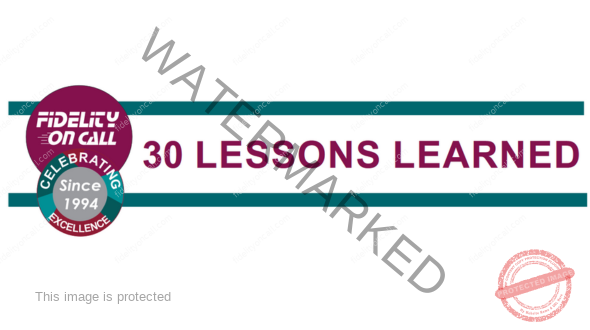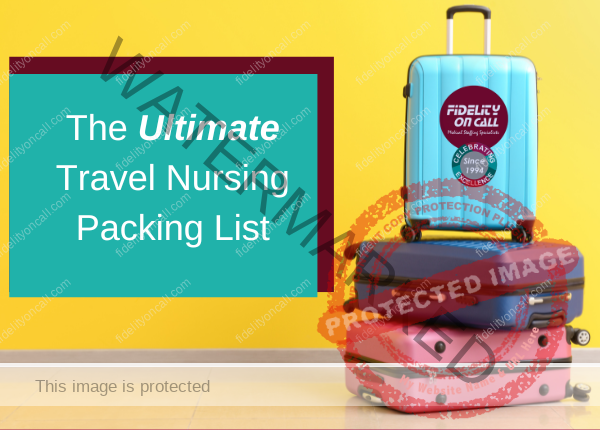We know our travelers find great fulfillment in their work, knowing they are making a difference while also enjoying the new opportunities that come from travel nursing. As we celebrate 30 years in business, we asked our elite team what they love most about Travel Nursing. Here are some of their responses…
1 I think the main thing I love about travel nursing is diversity. I get the opportunity to work with different people, in different settings, and with different policies and protocols every few months! It keeps things fresh, and it has helped me develop a wider scope of experiences and learning. I love it!
_________
2 I love travel nursing because I get to see how different hospitals, units and team members approach patient care.
_________
3 The thing that I love most about travel nursing is the flexibility to make the best choices that balance my work and personal life.
_________
4 The flexible schedules, endless experience, and frequent changes prevent the “burnout” feeling! Coming from a mother of two young children, it is the best decision I made. I am home every night and never miss a school function!
_________
5 I love the challenges and friendships that travel nursing brings!
_________
6 What I love about travel nursing for Fidelity On Call is that I am driven to be a beacon of excellence for myself, my peers, and most importantly, my patients.
_________
7 I love collaborating with different healthcare teams from the various facilities I contract with. They are able to utilize my knowledge and expertise to streamline a process or policy.
_________
8 I love the freedom and flexibility of travel nursing. Traveling has allowed me to work while pursuing my educational goals. I love travel nursing because of the professional growth I’ve experienced. Adapting in each experience has added to my skill sets. I have learned so much since becoming a travel nurse.
_________
9 One of the things I love about travel nursing is the ability to simply take care of my patients without all the drama of the politics that interfere with nursing care from staff nurses!
_________
10 I love the flexibility of travel nursing. I am able to choose contracts that allow me to maximize the time I can spend with my family. I also love getting to work with so many different people.
_________
11 I have been traveling for many years. What I love about my job is all the places I have seen, the people I have met and the different ways to do the same things medically that I have learned. What I love about working for Fidelity is the personal treatment I receive from all the staff. I have never had a problem or concern my recruiter or support staff hasn’t taken care of. I truly love being an RN, further I know I work for the best company ever.
_________
12 Travel nursing to me means being in control of my nursing journey. Working with Fidelity has allowed me to grow not only as a nurse, but as a person. Although I don’t travel far in mileage, I have stepped out of my comfort zone and it has been amazing. I look forward to many more adventures with Fidelity.
_________
13 Working for Fidelity On Call allows me to love what I do. I get to take care of my patients and give the best possible care. I also can make an income capable of supporting my family and not have to work enormous amounts of overtime doing so.
_________
14 Travel nursing is a great way to expand my professional resume while enjoying exciting new experiences. The thing I love is that I am given the opportunity to learn new skills and techniques that each different hospital uses as well as meet amazing staff members.
_________
15 What I love about travel nursing is the opportunity to experience life beyond the hospital, meeting new people, and let’s not forget the pay is great and my benefits are unbeatable.
_________
16 Beingng a nurse has impacted my life on so many levels. As a travel RN, the constant diversity has me learning, changing and growing on a daily basis. Professionally, I have never felt stronger and more proficient than I do now.
_________
17 I love travel nursing because I get to meet new people and see new places. I also get to see a variety of different diagnoses and that helps keep my skills up to date.
_________
18 I love the opportunity to explore a different facility, work with new people, and care for patients with a variety of different conditions.
_________
19 What I love about travel nursing is it allows me to travel the world!
_________
20 I enjoy travel nursing because of the opportunity to build so many wonderful friendships!
_________
21 I love the challenge of being a travel nurse. It seems that there is always something new and exciting.
_________
22 I have been a travel nurse for many years and would never go back to working at just one hospital again. It is great to have someone who advocates for me – not only the assignment but they have my back if there is a question or problem that needs to be addressed.
_________
22 I love the freedom of traveling nursing – not tied down after one contract and you get to do what you want.
_________
24 My absolute favorite thing about travel nursing is the flexibility it allows me in all aspects of my career.
_________
25 I love travel nursing because I get to meet new people and learn new things/views instead of getting “stuck” in the same routines/treatments which allows me to better care and advocate for my patients.
_________
26 I like that I can work three days and be home with my family.
_________
27 I like what I do and learning more with each assignment I have. But, I also like my recruiter and the fact that I can always reach out to talk to someone when I feel stressed. She is always there for me.
_________
28 I like that I can go from hospital to hospital. I don’t have to stay at the same one. Sometimes, I need that break.
_________
29 Travel nursing offers me much more experience because I get a wide diversity of patients. I like that I am always learning and growing with every hospital that I am at.
_________
30 I have worked for several nurse agencies. find that the company I work for makes a big difference in how I feel about my assignment. Fidelity On Call has always been there for me. I like how I am treated by my recruiter and I also like that the company recognizes me when I do a good job.






